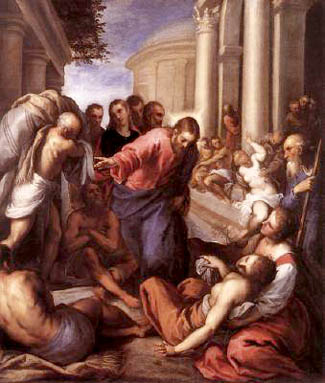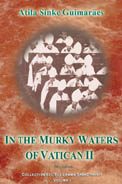 |
Consequences of Vatican II
Confession after Vatican II - Part I
Factors that Discourage Going to Confession
Fr. Stephen F. Somerville
When Jesus Christ at age 30 began his public Gospel ministry of teaching and sanctifying and leading by His powerful words and deeds, one of the things that He often did was to forgive sins. Do you remember the woman, Mary Magdalene, who washed Jesus' feet with her penitent tears before a shocked Pharisee?

Our Lord heals the paralyzed man and forgives his sins - Painting by Tintoretto |
Do you recall the paralytic young man who was let down through the roof into the crowded room where Jesus was? Do you remember the prodigal son whose father held a great feast for him when full of shame he returned home from that foreign pig farm? Do you recall the shepherd who, losing just one of his hundred sheep went to find it and tenderly carried it back home? Could you forget the Good Thief on the Cross, to whom Jesus said, "This day thou shalt be with Me in Paradise"?
In all these cases of parable or of fact, Jesus did not merely forgive, great although be this favor. Jesus Christ actually declared or demonstrated the forgiveness. He did not merely say "I forgive you," or "I forgave him." He said with emphasis, "Thy sins are forgiven," or "I tell thee, her many sins are forgiven." He said, "There is more joy among the Angels in Heaven over one sinner who repents, more than over ninety-nine just who have no need of repentance."
After Our Lord Jesus Christ had offered his stupendous act of atonement on the Cross for human sins, having prayed for his killers, "Father, forgive them," what did He do to perpetuate His work of forgiveness after His Resurrection and Ascension to Heaven? St. John tells us (it is the Gospel passage on Easter Octave day): Jesus appeared to all his Disciples together (except Thomas), and as the first item, He solemnly commanded them to carry out the ministry of forgiving sin which He had been doing. He said, "As the Father hath sent Me, I also send you. Receive the Holy Spirit. Whose sins ye shall forgive, they are forgiven them: and whose sins ye shall retain, they are retained" (Jn 20:21-23). Notice the strong declaration: "The sins, they are forgiven them" or, in case of no-repentance or of delayed absolution, "they are retained."
By these words, the Apostles and the succeeding Bishops and priests are empowered and commanded to bestow forgiveness on sinners. They do this by administering the sacraments of Baptism and Penance. Bear in mind that sins committed after Baptism must be both repented and confessed. Sins before Baptism are to be repented only.
Changes in the Sacraments caused by Vatican II
All the Seven Sacraments, including Penance or Confession, have recently been revised and changed in the Roman rite of the Catholic Church because of ideas and plans put forward in the Second Vatican Council held in the 1960s. I think most of my readers, especially the older persons, are aware of this. You understand particularly that the Mass has been changed very much. Many Catholics today prefer to attend the Tridentine Mass. I think you know that many people sustain that the new Mass, called Novus Ordo, could well be invalid because of certain changes in its essential parts. Perhaps you wonder whether something similar has happened with the Sacrament of Penance.

The traditional ornate private confessional has been replaced by an open "reconciliation room," below.
 |
Let us look at this question more carefully. Is the Sacrament of Penance at risk because of conciliar and post-conciliar changes since the 1960s? Is the absolution of the priest nowadays quite valid? For that absolution is the essential word or form of the Sacrament. Is the matter of the Sacrament also adequate? The matter for Penance or Confession is actually the acts of the penitent. What precisely are these acts? They are three: Contrition, Confession, and Satisfaction. I will explain more about these in other installments of the series of articles that we are pursuing on this Sacrament. The priest adds his own gesture to this sacramental matter, when he extends his right hand over or toward the penitent while pronouncing the absolution formula.
At the start of this survey of the new order of Confession, let me speak clearly: Yes, I do expect to find trouble. And why trouble?
• Because Vatican Council II is marked by the evidence that important theologians and Prelates tried to introduce Progressivism (1) everywhere they could.
• Because Russia should have been consecrated to the Immaculate Heart of Mary and converted to the Catholic Faith by the 1960s. This did not happen and all the Popes since 1917 have declined, without explanation, to do this consecration.
• Because the Devil appeared to Pope Leo XIII in the 1890s and bragged that he would destroy the Catholic Church in the 20th century. We can all see, I hope, that the Devil has had huge successes in this destruction.
• Finally, I naturally expect to find trouble in the Confession field because of the huge drop in the numbers of penitents approaching this Sacrament since the middle 1960s. I saw this drop in person as a priest, for I was ordained already in the mid-1950s, and I remember the long lines of penitents on Saturday nights in the parish Church.
Why Catholics go less and less to Confession?
Some questions may arise. If the downturn in penitents is large, if people come seldom or never to confession, and if serious sins are now more widely committed, does it matter whether the Sacrament is being given or received invalidly? If the Sacrament is still valid but ignored, will not the Devil and the progresssivists be quite happy? If sick people stop going to the doctors, will they not die sooner, even if the doctors are competent?
These questions are quite justified. This first problem with Confession today is not with the Sacrament but with the sinners. They neglect it. And by the way, so do many priests.
Another problem for Confession could be said to be poor religious instruction. I think you know, at least in a vague way, that the traditional Catechism, which taught children by means of memorized short questions and answers, has been generally disappearing. We cannot go into this problem just now. But we can repeat the observation that Catholics have been losing the sense of sin. Catholics have been subtly encouraged to form their own subjective moral position on right and wrong, no longer the objective traditional position of the Church. This subjectivism leads to Liberalism, that liberty to follow one’s own opinion, and not the laws of God and Church. John XXIII in 1962 began Vatican II Council by declaring we should administer the medicine of mercy, and not of severity.

The repented Magdalene by El Grecco |
The traditional and very expressive Act of Contrition was no longer taught to the young children. The new Catholic teachers, mostly lay persons, were probably confused by the many alternative prayers for that traditional Act of Contrition. They were trained to pick one that did not mention Hell (almost none of them did!), and did not express attrition or imperfect contrition - sorrow for sin from fear of Hell, of eternal punishment. Perfect contrition is based on the love of God and the horror of having offended His divine goodness. But, it is evident, such perfect contrition is demanding, especially for a child, or for anyone living in a lukewarm or worldly environment. Prevailing ignorance around these factors will certainly help to deaden the sense of sin. The result is inadequate Confession, and less frequent Confession. Children were moreover prepared late for their first Confession, about a year after and no longer before, their First Communion.
It is necessary to mention here the famous Encyclical of Pope Paul VI in 1968 on the regulation of births. Its name was Humanae vitae, that is, "Of human life." It appeared three years after Vatican II, in the decade of the 1960s that began the modern Cultural Revolution, sometimes called the sexual revolution.
It was met by a loud barrage of criticism and indignant rejection, not only by worldly people, but even by many Catholic theologians and Bishops. It affirmed the natural and intrinsic wrongness of artificial contraception, whether by pills or barrier devices. We know now, even more clearly than in 1968, that if it were natural to allow to married couples intimate indulgence without openness to the transmission of life, it would certainly lead to the lowering of all other chastity barriers or prohibitions. We should note in passing that the arrival and spread of contraceptives was followed rapidly by a huge increase in separation and divorce of Catholic spouses. These broken marriages tend to be whitewashed by being called Church Annulments. But the general effect of them is a lowering of morality and a greater distaste for Confession.
Besides observing the loss of the sense of sin, we must also recognize diminished respect for authority. This exaggeration of freedom so as to do what one wants is a mark of Liberalism. It is also a barrier to the governance by priests, and especially by Bishops, including the Pope himself. The Holy Father and the Bishop, if bold enough to state the law clearly, will likely say it in mild or vague words, and do little or nothing to enforce it. This state of affairs is another incentive to stay away from Confession, which is the sacramental recognition of the authority of God. "Teach them," said Jesus, "to observe all that I have commanded you."
These foregoing paragraphs indicate problem areas in the Church that, while externally tending to discourage the use of Confession, are not part and parcel of the Sacrament, that is they do not touch the actual wording, the internal essence or form of the Sacrament. In our next installment, we will look to see what internal or intrinsic changes have been made in the official wording (the “form”) of the Sacrament of Penance.
1. Progressivism is the false notion that religious and doctrinal matters must be updated from time to time so as the better to express human progress, contemporary culture, current religious opinions, and so forth.

Posted May 8, 2007

Related Topics of Interest
 Desacrificing the Mass - Part I Desacrificing the Mass - Part I
 Desacrificing the Mass - Part II Desacrificing the Mass - Part II
 New Mass in Latin - Comments on Sacramentum Caritatis New Mass in Latin - Comments on Sacramentum Caritatis
 Crisis in Catechism Crisis in Catechism
 The Bugnini Liturgy and the Reform of the Reform The Bugnini Liturgy and the Reform of the Reform
 The Catholic Revolution: New Wine, Old Wineskins and Vatican II The Catholic Revolution: New Wine, Old Wineskins and Vatican II
 Is the Catholic Crisis Really Explained? Is the Catholic Crisis Really Explained?
 The Canonization of Wojtyla - the Moral Free Pope The Canonization of Wojtyla - the Moral Free Pope
 Resisting the Novelties of the Conciliar Church Resisting the Novelties of the Conciliar Church
 The New Mass: A Flavor of Protestantism The New Mass: A Flavor of Protestantism



|
Vatican II | Hot Topics | Home | Books | CDs | Search | Contact Us | Donate

© 2002-
Tradition in Action, Inc. All Rights Reserved
|
 |
|